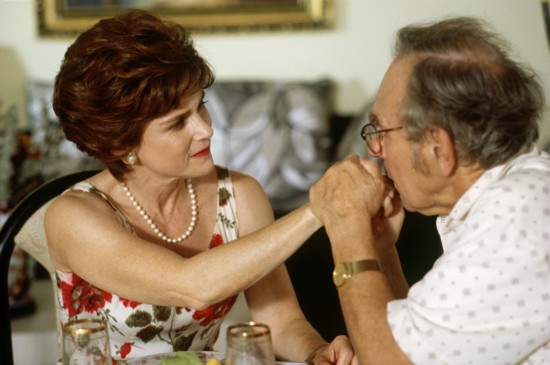|
Reviews of Recent Independent, Foreign, & Documentary Films in Theaters and DVD/Home Video
Written & Directed by Jan Schütte, based on short stories by Isaac Bashevis Singer Produced by Martin Hagemann & Kai Künnemann Directors of Photography, Edward Klosinski & Chris Squires Edited by Katja Dringenberg & Renate Merck Music by Henning Lohner Released by Kino International Germany/Austria/USA. 86 min. Not Rated With Otto Tausig, Tovah Feldshuh, Barbara Hershey, Rhea Perlman, Elizabeth Peña & Caroline Aaron Different milieus from the life of preeminent Yiddish writer Isaac Bashevis Singer have already inspired several films: his pre-war early years in Poland (Yentl and Menahem Golan’s The Magician of Lublin) and his post-war middle years in New York, haunted by the Holocaust, (Paul Mazursky’s Enemies, A Love Story). In Love Comes Lately, German writer/director Jan Schütte offers a poignant valentine to the creativity of Singer’s later years. Schütte ties together three of Singer’s stories from the 1960s and 1970s as a tribute to how an elderly writer, Singer’s alter-ego Max Kohn, can still have brilliant insight into human nature, even as his body is failing and the past encroaches on the present. In the semiautobiographical story “The Briefcase,” Kohn keenly observes people while he travels on trains between his life in a cluttered New York City apartment to lectures around the country. He mentally drifts between his memories, fantasies, and nightmares. The marvelous octogenarian Austrian actor Otto Tausig plays Kohn as well as the central characters in Kohn’s stories, morphing from an absent-minded professor with prostate problems into lonely widowers reluctantly retiring in a Miami Beach full of threats from bankruptcy, hurricanes, murder, and suicide. Kohn and his alter-egos attract lively and intelligent women of all ages and intentions, with most of their pungent dialogue coming directly from Singer: his longtime, crusty companion Reisel (Rhea Perlman), legitimately suspicious of his fidelity, and his former student Rosalie (Barbara Hershey), just back from Israel. (In The Farewell, Schütte focused on the many women surrounding Bertolt Brecht’s final years.) Elements from these wistful and passing encounters of the first story become “Old Love”, a new work that Kohn reads to a rapt Jewish literary group (a crowd compared to his sparse college audience for his lecture on “Fate and Free Will in Modern Literature” that conflicted with a popular hockey game). The story’s Ethel Goodman Brockeles, a widow embodied by Tovah Feldshuh, vividly conveys the passion of a fulfilling marriage to a much older man. Her very moving monologue enraptures her new neighbor Harry Bendinger (Tausig again) as she suddenly offers and abruptly withdraws a similar relationship with him. While Schütte excises Singer’s self-deprecating comparisons to Biblical figures, these more secular and assimilated characters are still culturally Jewish, with Yiddish accents or inflections, and bristling at questions as if under Gestapo interrogation. Singer’s alter-egos are flummoxed by multi-ethnic America beyond familiar enclaves, from Kohn’s confrontation with a stubborn Sikh motel clerk to a challenging, crippled Cuban housekeeper (Elizabeth Peña) for whom Simon Danziger (Tausig yet again) provides shelter from the storm in a dreamy adaptation of the story “Alone”.
Far warmer than Andrew Wagner’s Starting Out in the Evening (about another aging New York Jewish writer and his women), the lovely
cinematography reflects how Edward Klosinski, who died earlier this year, shaped moods, as he did with a darker palette in the also regret-filled
Gloomy Sunday. While one fan asks Kohn why all his stories end sadly, the Singer alter-egos here are wise and vital observers, leaving us with
the appreciation that as long as an artist perks up at the sight of a pretty woman, his imagination can transmute that feeling into art.
Nora Lee Mandel
|

